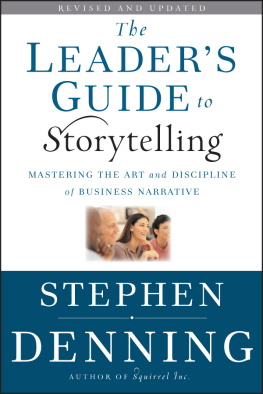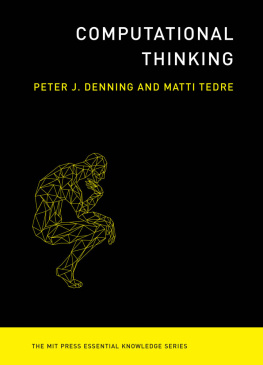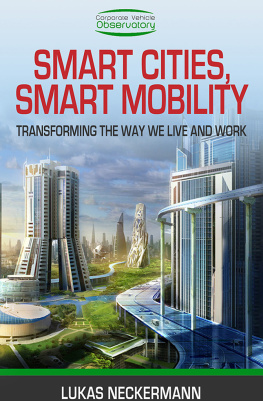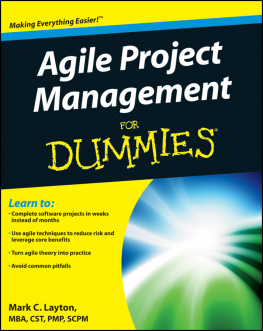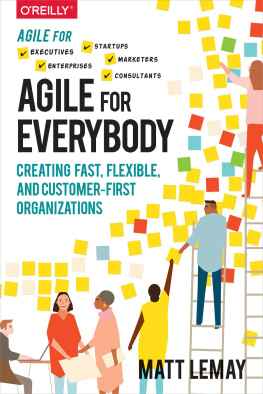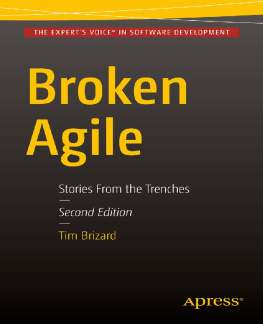Stephen Denning - The Age of Agile: How Smart Companies Are Transforming the Way Work Gets Done
Here you can read online Stephen Denning - The Age of Agile: How Smart Companies Are Transforming the Way Work Gets Done full text of the book (entire story) in english for free. Download pdf and epub, get meaning, cover and reviews about this ebook. year: 0, genre: Business. Description of the work, (preface) as well as reviews are available. Best literature library LitArk.com created for fans of good reading and offers a wide selection of genres:
Romance novel
Science fiction
Adventure
Detective
Science
History
Home and family
Prose
Art
Politics
Computer
Non-fiction
Religion
Business
Children
Humor
Choose a favorite category and find really read worthwhile books. Enjoy immersion in the world of imagination, feel the emotions of the characters or learn something new for yourself, make an fascinating discovery.

- Book:The Age of Agile: How Smart Companies Are Transforming the Way Work Gets Done
- Author:
- Genre:
- Year:0
- Rating:4 / 5
- Favourites:Add to favourites
- Your mark:
- 80
- 1
- 2
- 3
- 4
- 5
The Age of Agile: How Smart Companies Are Transforming the Way Work Gets Done: summary, description and annotation
We offer to read an annotation, description, summary or preface (depends on what the author of the book "The Age of Agile: How Smart Companies Are Transforming the Way Work Gets Done" wrote himself). If you haven't found the necessary information about the book — write in the comments, we will try to find it.
The Age of Agile: How Smart Companies Are Transforming the Way Work Gets Done — read online for free the complete book (whole text) full work
Below is the text of the book, divided by pages. System saving the place of the last page read, allows you to conveniently read the book "The Age of Agile: How Smart Companies Are Transforming the Way Work Gets Done" online for free, without having to search again every time where you left off. Put a bookmark, and you can go to the page where you finished reading at any time.
Font size:
Interval:
Bookmark:
Thank you for downloading this AMACOM eBook.
Sign up for our newsletter, AMACOM BookAlert,
and receive special offers, access to free samples, and
info on the latest new releases from AMACOM,
the book publishing division of
American Management Association.
To sign up, visit our website: www.amacombooks.org
To learn more about the American Management
Association visit: www.amanet.org

The copyright information for this title may be found at the end of this eBook file.
At a time when the quest for shareholder value is leading many companies to shortchange their customers, employees, and everyone else, Steve Denning reminds us that it doesnt have to be this way. Rich with examples of Agile management at work, The Age of Agile envisions an economy that is more innovative, more humane, and more inclusive.
LYNN S. PAINE,
John G. McLean Professor of Business Administration,
Harvard Business School, and coauthor of Capitalism at Risk:
Rethinking the Role of Business
An invaluable guide to transforming the oldunadaptive hierarchical managementinto the newthe customer-involved, team-empowered company capable of continuously re-inventing itself.
ROBERT M. RANDALL,
Editor-in-Chief, Strategy & Leadership, and editor/author of
The Portable MBA in Strategy
Steve Dennings The Age of Agile is a call to arms for why we must improve our innovative performance and a manifesto for making that happen. This manifesto shows how enterprises with essential behaviors, tools, and processes can liberate the genius of staff to create great value for their customers, enterprises, investors, staff, and society.
CURTIS R. CARLSON,
CEO, Practice of Innovation, LLC; former CEO of
SRI international (19982014)
In The Age of Agile, Steve Denningone of our leading management thinkersdemonstrates why and how a passion for products, not profits, is the key to successful business enterprise.
WILLIAM LAZONICK,
Professor of Economics at the University of Massachusetts Lowell,
and codirector of its Center for Industrial Competitiveness
In Silicon Valley, companies that grow big usually start to lose their way. Steve Denning, in The Age of Agile, shows how to avoid the common pitfalls startups make as they scale into larger, more mature companies. It is a blueprint for startups, small businesses, and large publicly traded companies alike.
STEPHEN FORTE,
Managing Partner, Fresco Capital
The Age of Agile should be a key companion to guide business leaders in their quest to address the biggest challenge set out by Peter Drucker for management in the twenty-first century: achieving a step change in the productivity of knowledge work. Without trying to give recipes, the book provides many lively and recent case studies and relevant background perspectives that will help leaders to re-frame the practice of current industrial-age management and to chart their unique way into an increasingly complex and unpredictable future.
RICHARD STRAUB,
founder and President of the Global Peter Drucker Forum
The Age of Agile is a tour de force. As a CEO strategy advisor, this is the most exciting book I have read this year. Finally, someone has laid out the core principles and, with the help of pertinent, easy-to-understand examples, lays out what it takes to apply Agile to any organization. Thank you, Steve Denning!
SETH KAHAN,
author of Getting Change Right and Getting Innovation Right

How Smart Companies Are
Transforming the Way Work Gets Done
STEPHEN DENNING

To Stephanie, for all that she inspires in me.
Bureaucracy is the default operating system for virtually every large-scale organization on the planet. Founded on the ideology of controlism, it elevates conformity above all other organizational virtues. Bureaucracy constitutes an organizational caste system that differentiates between the thinkers (managers) and the doers (employees). As a consequence, bureaucracy squanders enormous quantities of human initiative and imagination.
Todays creative economy needs a radical rethink of our top-down, tradition-encrusted management principles and processes. The challenge: building organizations that are as innovative as they are efficient, as passion-filled as they are pragmatic.
This is not merely about implementing a new practice, process, or structure. Instead, we have to start with a new set of management principles, among which four are particularly vital: transparency, competence, localization, and upside.
Nucor, the most consistently profitable steel company in the world, practices radical transparency. Every single associate knows the profitability of every order that ships. At Nucor, it is the frontline employees, not managers, who are responsible for maximizing margins.
Empowerment also depends on competence. Take Morningstar, the worlds largest tomato processor. It has no managers and all key investment decisions are taken by individuals who in other organizations would be regarded as blue collar employees. Most of these employees are capable of sophisticated financial modelingthey can calculate the net present value and internal rate of return of new investments. Instead of moving decisions upward at Morningstar, they have moved competence downto individuals who have the information and the context to make the best decisions.
If you want individuals to think and behave like owners, the organization must be decomposed into small, localized unitseach with its own profit and loss (P&L) responsibility. All employees need to be able to see a direct line between their contribution and the profitability of the microbusiness in which they work. In large, monolithic organizations, there is little sense of accountability for results and little discretion in decision making. The result: employees who show up at work physically, but leave most of their discretionary energy at home.
Finally, if you want people to give their best, they must have an upsidethat is, the possibility of personal and financial growth. In most organizations, fixed salaries and role definitions give individuals little incentive to do more than merely meet their targets. There is virtually no room for internal entrepreneurship.
These findings are entirely consistent with what Steve has observed in organizations that are committed to small, agile teams. Make no mistake, the management revolution is well under way. The only question for your organization is whether it is going to lead or follow.
Gary Hamel
Professor, London Business School and
Director, Management Lab
Font size:
Interval:
Bookmark:
Similar books «The Age of Agile: How Smart Companies Are Transforming the Way Work Gets Done»
Look at similar books to The Age of Agile: How Smart Companies Are Transforming the Way Work Gets Done. We have selected literature similar in name and meaning in the hope of providing readers with more options to find new, interesting, not yet read works.
Discussion, reviews of the book The Age of Agile: How Smart Companies Are Transforming the Way Work Gets Done and just readers' own opinions. Leave your comments, write what you think about the work, its meaning or the main characters. Specify what exactly you liked and what you didn't like, and why you think so.

